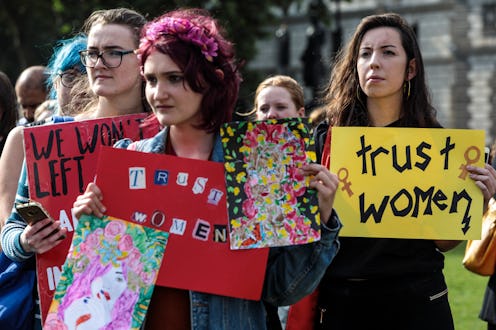News
New Mexico Could Decriminalize Abortion & Advocates Lay Out What That Really Means

Reproductive rights advocates are currently spending a lot of energy on the fight to preserve abortion access on the state level. In recent months, states like New York and Massachusetts have successfully enshrined such protections in their state laws, but the effort to protect abortion rights isn't limited to the East Coast. On the other side of the continental United States, New Mexico is gearing up to decriminalize abortion, and the bill's advocates tell Bustle that they've been working to clear up a lot of misconceptions about what that means.
A 1969 state law criminalizing abortion is still technically on the books in New Mexico. Reproductive rights advocates are pushing a bill — referred to as HB51 — that would repeal that law. The bill has already passed the state House. It's expected go to a vote in the state Senate this week, and New Mexico Gov. Michelle Grisham has promised to sign it into law if it makes it to her desk.
"The fact that there are active attacks against Roe v .Wade right now, and that there are national experts in the field saying that this is very likely to be overturned or dismantled in some way, means that we need to protect our New Mexican providers and New Mexican women and stay strong with the values in New Mexico that have kept abortion safe and legal for many, many years," Charlene Bencomo, the executive director of Young Women United in New Mexico, tells Bustle.
Rather than waiting to see whether abortion rights will be stymied, Bencomo says, advocates are trying to preemptively take control of the situation in case Roe is ever repealed or gutted. That being said, she says, HB51's advocates have encountered serious misconceptions about what their bill aims to do.
The biggest misconception, she says, is that some people think abortion would become illegal in the state if the bill fails. “And that is not what this is about,” Bencomo says. “This does not end abortion access in New Mexico. Nor does it expand access. It maintains the status quo.”
But beyond codifying protections provided under Roe, HB51's proponents also point to the fact that abortion access has a particularly strong impact on communities of color — especially because New Mexico is one of the few states wherein the majority of the population are people of color.
"We know that removing access to abortion disproportionately affects women of color and those who are living in poverty," Bencomo says. She adds that New Mexico also has high rates of poverty.
And Marshall Martinez, the public affairs director in New Mexico for Planned Parenthood of the Rocky Mountains, tells Bustle that HB51's success could also challenge stereotypes associated with how communities of color view abortion.
"We are working hard to bust the pervasive myth that Americans — New Mexicans, but really Americans — in rural communities and communities of faith and communities of color are opposed to abortion access," Martinez says. He adds that "this work has been done, it has been led by, and is centered in communities of color and communities of faith."
One potential hurdle for HB51's passage is that the bill, as it stands now, would eliminate the state's so-called "conscience clause," which allows medical providers to refuse to perform abortion procedures on moral grounds. However, New Mexican American Civil Liberties Union attorneys have argued that such protections already exist on the federal level, making the New Mexican clause redundant.
The HB51 advocates who spoke to Bustle underscore that, like other states pushing through similar initiatives, they are simply trying to be proactive.
"So rather than scrambling at the last minute if things change in our state," Bencomo says, "we’re trying to take control of the need to respect the decision of women to make choices about their own bodies, [as well as] respect the providers to do their jobs in a safe and regulated way. "